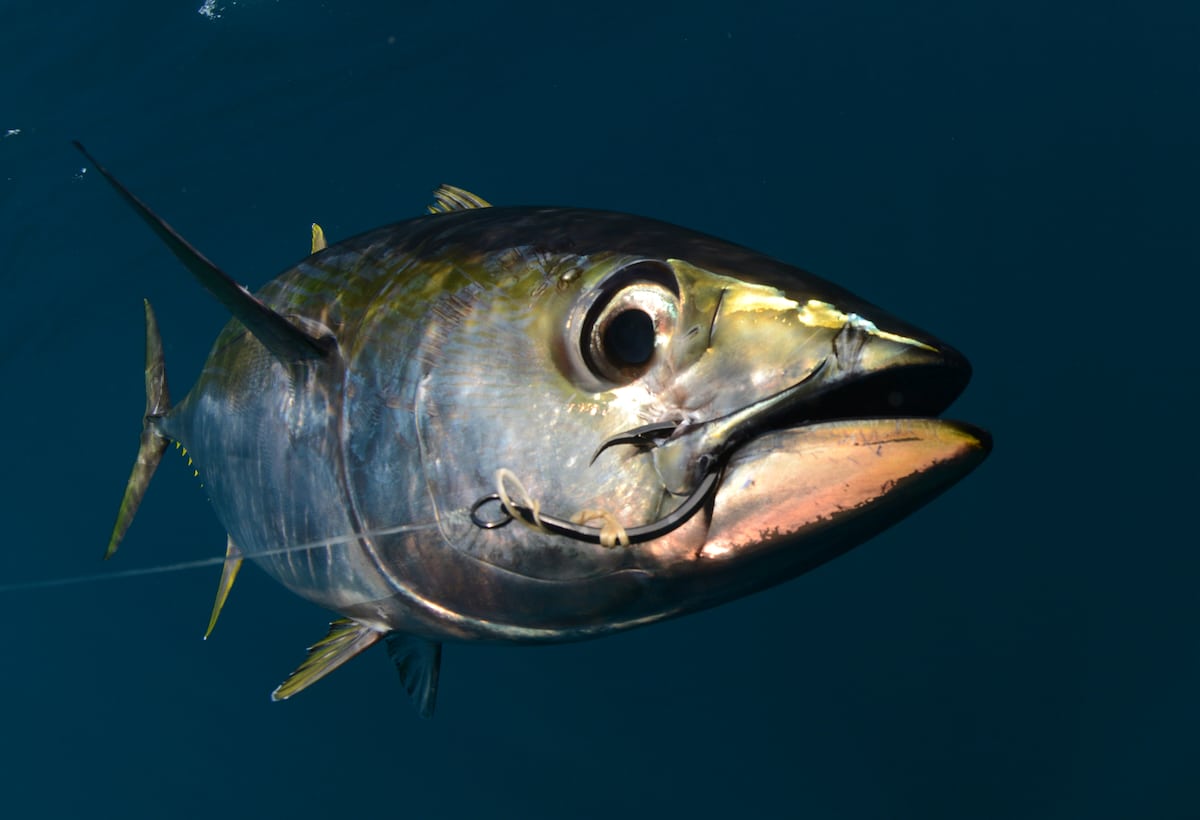Popular Sashimi Tuna Species in Sharp Decline in Indian Ocean

 Why you can trust us
Why you can trust us
Founded in 2005 as an Ohio-based environmental newspaper, EcoWatch is a digital platform dedicated to publishing quality, science-based content on environmental issues, causes, and solutions.
The yellowfin tuna that is commonly used to make sashimi and other dishes like poke bowls may become scarce if overexploitation rates don’t improve, particularly in the Indian Ocean, a press release from international research initiative the Sea Around Us said.
A new study by an international team of researchers has found that, since the industrial exploitation that began in 1950, the weight of a yellowfin tuna population in the water has decreased by an average of 54 percent throughout the four tuna populations managed by Regional Fisheries Management Organizations (RFMO).
The biomass of yellowfin tuna in the Indian Ocean has declined by 70 percent in the last 70 years.
“If we look at more recent years, we can see that global yellowfin tuna populations continue to struggle. Biomass continues to decline everywhere except for stabilizing trends in the Western Pacific Ocean, prompted by management interventions,” said Kristina Heidrich, the study’s lead author and a Ph.D. candidate with the University of Western Australia (UWA)’s the Sea Around Us – Indian Ocean, in the press release.
The study, “Multiple lines of evidence highlight the dire straits of yellowfin tuna in the Indian Ocean,” was published in the journal Ocean & Coastal Management.
“In most places, extractions have regularly surpassed the maximum sustainable yield or MSY limit, which is the level that would allow for the highest possible catches to be sustained over time, given that environmental conditions don’t change much,” said Dirk Zeller, one of the study’s co-authors and director of the Sea Around Us – Indian Ocean, in the press release.
The researchers used the results of RFMO’s time series and assessment of yellowfin biomass in order to estimate the yearly changes from 1950 to 2020. They also used the CMSY++ stock assessment method, which mostly uses a time series of catches to gauge the level of fish stocks. They then examined 955 yellowfin tuna records from samplings independent of fisheries using Baited Remote Underwater Video Systems (BRUVS), which record ecological and biological data like biomass and species size and abundance in a certain area.
“The data collected with BRUVS provided a more holistic and fisheries-independent picture of the pelagic community and the status of the populations, which can complement fisheries-dependent data and analyses,” said Jessica Meeuwig, a study co-author and director of the Marine Futures Lab at UWA, in the press release. “These fisheries-independent BRUVS data suggest that, since 2014, yellowfin tuna in the Indian Ocean are the least common, least abundant, have the lowest biomass, and are the smallest yellowfin tuna in the existing dataset.”
The CMSY++ method showed that yellowfin tuna were not currently being subjected to overfishing in the Atlantic and western and eastern Pacific Ocean, despite their exploitation rates slightly exceeding the MSY limit over the past decade.
Overfishing is ongoing in the Indian Ocean.
“Beyond yellowfin tuna fisheries contributing more than US$16 billion to the global economy yearly, the species is an apex predator that plays a critical role in the functioning, productivity and overall health of marine ecosystems,” said Daniel Pauly, study co-author and the principal investigator of the University of British Columbia’s the Sea Around Us initiative, in the press release. “The risk of population collapse is high if current management does not adapt. Stringent management constraints must be implemented to reduce overall fishing capacity, rebuild overfished populations, and reduce the collateral damage these fisheries cause to other species such as sharks.”
The research team pointed out that management organizations can enhance the transparency, confidence and accuracy of the information they use in decision-making by also employing multiple lines of evidence to cross-validate each other. They also suggested using stricter management measures like implementing effective catch limits, reducing fishing capacity and enforcing the MSY limit.
“In the Indian Ocean in particular, a catch reduction of 30 per cent from 2020 levels is urgent to halt and reverse the decline in yellowfin tuna population,” Heidrich said in the press release.
Subscribe to get exclusive updates in our daily newsletter!
By signing up, you agree to the Terms of Use and Privacy Policy & to receive electronic communications from EcoWatch Media Group, which may include marketing promotions, advertisements and sponsored content.

 233k
233k  41k
41k  Subscribe
Subscribe 




